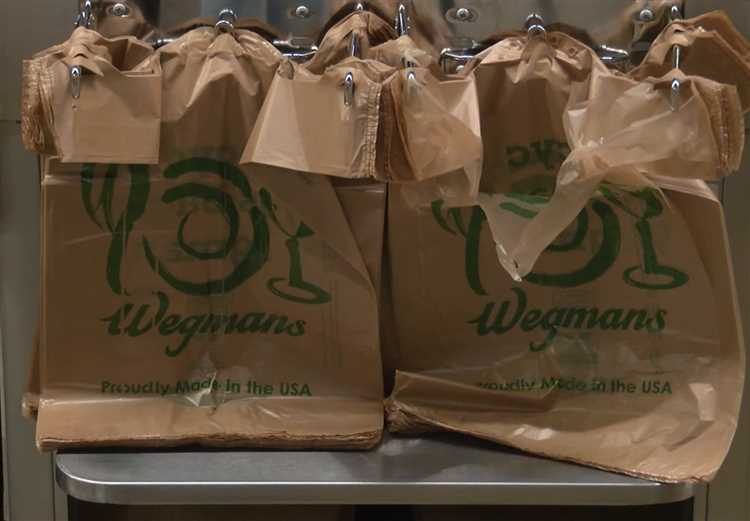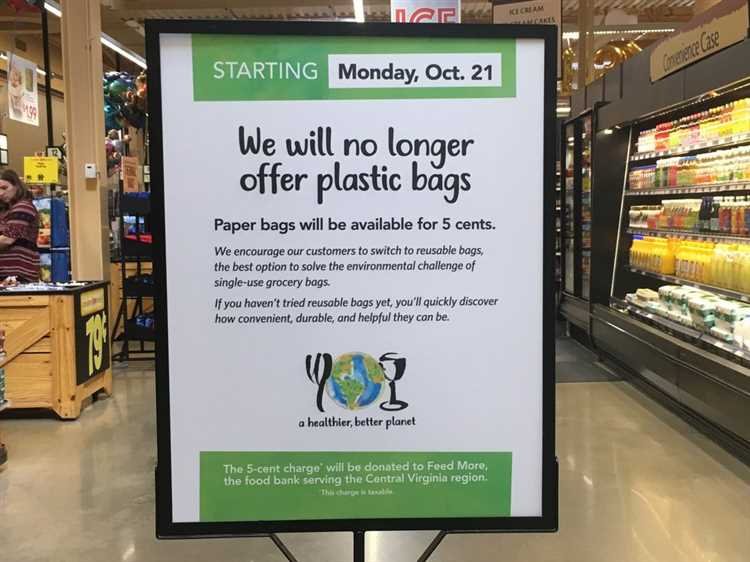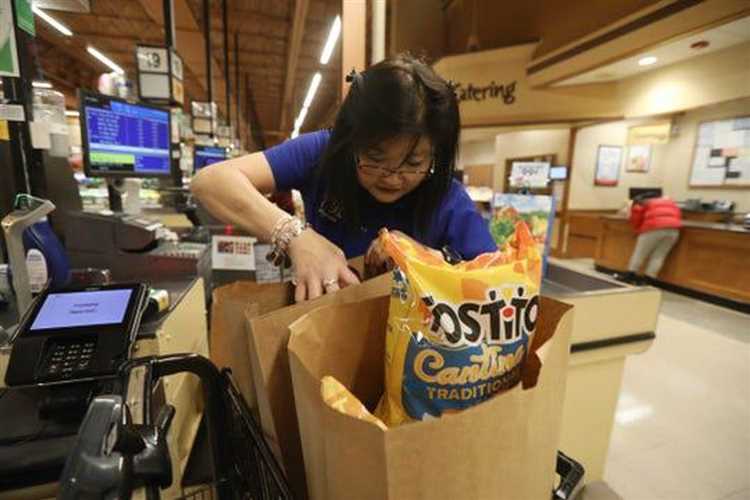In a move that has sparked both controversy and curiosity amongst shoppers, popular grocery store chain Wegmans recently announced that they will begin charging customers for paper bags. This decision has left many wondering why the change, and what it means for the future of sustainable shopping.
Wegmans, known for its commitment to environmental initiatives, has taken this step in an effort to further reduce waste and promote eco-friendly practices. By implementing a charge for paper bags, the company aims to encourage customers to bring their own reusable bags and reduce single-use plastics.
While this decision may come as a surprise to some, it aligns with Wegmans’ ongoing efforts to prioritize sustainability. The grocery store chain has been actively working towards reducing its environmental impact by implementing various initiatives, such as installing solar panels in their stores, implementing composting programs, and promoting local agriculture.
By charging for paper bags, Wegmans hopes to create a shift in consumer behavior and encourage individuals to make more conscious choices when it comes to their shopping habits. This move not only reflects the company’s commitment to sustainability but also highlights the importance of individual actions in creating a greener future for all.
- The Importance of Sustainability for Wegmans
- Evaluating the Environmental Impact of Paper Bags
- 1. Resource Consumption
- 2. Carbon Footprint
- 3. Reusability and Recycling
- 4. Alternative Solutions
- Consumer Behavior and the Demand for Paper Bags
- Environmental Consciousness
- Perception of Quality
- Economics of Implementing a Fee for Paper Bags
- Cost Reduction
- Customer Behavior
- Competitive Landscape
- Question-answer:
- Why did Wegmans decide to charge for paper bags?
- How much will Wegmans charge for paper bags?
- Will this change apply to all Wegmans stores?
- What alternatives to paper bags does Wegmans offer?
- Are other grocery stores implementing similar policies?
The Importance of Sustainability for Wegmans
Wegmans, a leading grocery store chain, recognizes the crucial role that sustainability plays in protecting the environment for future generations. As a responsible company, Wegmans has implemented various initiatives to prioritize sustainability and reduce its carbon footprint.
One of Wegmans’ key sustainability initiatives is its commitment to waste reduction and recycling. The company encourages customers to bring their reusable bags and offers recycling options for plastic, paper, and other materials in its stores. By doing so, Wegmans aims to minimize the amount of waste that ends up in landfills and promote the reuse of resources.
Another important aspect of sustainability for Wegmans is its focus on local sourcing and supporting regional farmers. By partnering with local suppliers, Wegmans reduces the carbon emissions associated with long-distance transportation and supports the local economy. This commitment to local sourcing also ensures that customers have access to fresh and high-quality products.
Wegmans also emphasizes the importance of sustainable farming practices. The company works closely with its suppliers to promote eco-friendly agricultural methods that minimize the use of chemicals and protect biodiversity. Through its sustainable farming initiatives, Wegmans aims to support healthier ecosystems and preserve natural resources.
In addition to its internal efforts, Wegmans actively engages with its customers to promote sustainability. The company offers educational resources on its website and in-store to raise awareness about environmentally-friendly practices such as recycling, energy conservation, and reducing food waste. By empowering customers with knowledge and resources, Wegmans aims to foster sustainable behaviors beyond the walls of its stores.
The decision to charge for paper bags is another step in Wegmans’ sustainability journey. By discouraging the use of paper bags, which have a higher environmental impact than reusable bags, Wegmans encourages customers to choose more sustainable alternatives. The revenue generated from this change will also support the company’s sustainability initiatives and further its commitment to a greener future.
In conclusion, sustainability is of utmost importance to Wegmans. From waste reduction and recycling to local sourcing and sustainable farming practices, the company is dedicated to making a positive environmental impact. By engaging with customers and implementing new measures like charging for paper bags, Wegmans showcases its commitment to sustainability and sets an example for the retail industry.
Evaluating the Environmental Impact of Paper Bags
As Wegmans makes the decision to charge for paper bags, it is important to evaluate the environmental impact of this packaging option. While paper bags are often seen as a more eco-friendly alternative to plastic bags, it is essential to consider all aspects of their production, use, and disposal.
1. Resource Consumption
Paper bags are made from trees, a renewable resource. However, the production of paper bags requires significant amounts of energy, water, and chemicals. The process of turning trees into pulp and then into paper involves the use of energy-intensive machinery and chemicals like bleach and sulfates. Additionally, large amounts of water are needed for washing, bleaching, and drying the paper pulp.
2. Carbon Footprint
The production of paper bags also contributes to greenhouse gas emissions. The extraction of raw materials, manufacturing processes, and transportation all require energy and contribute to carbon dioxide emissions. Furthermore, the disposal of paper bags in landfills can generate methane, a potent greenhouse gas.
3. Reusability and Recycling
While paper bags can be reused and recycled, their durability compared to plastic bags is significantly lower. The lifespan of a paper bag is generally shorter, especially when exposed to moisture. Moreover, the recycling process for paper bags requires additional energy and resources compared to plastic bags.
Additionally, it is important to note that the recycling rate for paper bags is lower than that of plastic bags. According to the Environmental Protection Agency (EPA), the recycling rate for paper bags is around 37%, while plastic bag recycling rates tend to be higher.
4. Alternative Solutions
Considering the environmental impact of paper bags, it is essential to explore alternative solutions. Encouraging the use of reusable bags, such as canvas or cloth bags, can significantly reduce the consumption of both paper and plastic bags. These bags have a longer lifespan and can be recycled or composted at the end of their life.
Furthermore, educating consumers about the benefits of using reusable bags and providing incentives for their use can help shift consumer behavior and reduce the overall demand for single-use bags, whether paper or plastic.
- Conclusion: While paper bags may be perceived as a more eco-friendly option than plastic bags, they still have significant environmental impacts. Understanding these impacts can help inform consumers’ choices and encourage the adoption of more sustainable alternatives.
Consumer Behavior and the Demand for Paper Bags
Understanding consumer behavior is crucial for businesses to make informed decisions about their products and services. In the case of Wegmans’ decision to charge for paper bags, it is important to consider consumer demand for these bags and how it influences their purchasing decisions.
Environmental Consciousness

In recent years, there has been a growing emphasis on sustainability and environmental consciousness. Many consumers are now more aware of the impact of their actions on the environment and actively seek out environmentally-friendly alternatives. This has led to an increased demand for paper bags, which are viewed as a more eco-friendly alternative to plastic bags.
Perception of Quality

Consumers may perceive paper bags as a higher-quality option compared to plastic bags. The sturdiness and durability of paper bags can give consumers the perception that they are of better quality and can hold more items. This perception of quality can make paper bags more desirable for certain consumers.
- Marketing and Branding: Companies that use paper bags for packaging can leverage the environmental benefits in their marketing efforts. This can attract environmentally-conscious consumers who view the use of paper bags as a positive attribute of the brand.
- Reusable Option: Paper bags are often seen as a reusable option, as they can be easily folded and carried around for future use. Consumers who prioritize sustainability may choose paper bags as a way to reduce waste and contribute to the circular economy.
- Legal Restrictions: In some areas, there are legal restrictions on the use of plastic bags, which may have led to an increase in demand for paper bags. Consumers who are required by law to use alternative bagging options may opt for paper bags as a convenient and readily available alternative.
Considering these factors, it is clear that consumer behavior plays a significant role in driving the demand for paper bags. Businesses like Wegmans must carefully consider these factors when making decisions regarding the pricing and availability of paper bags.
Economics of Implementing a Fee for Paper Bags
When making the decision to charge customers for paper bags, Wegmans took into account various economic factors. Implementing a fee for paper bags can have both positive and negative effects on the company’s bottom line.
Cost Reduction

One of the main reasons behind the decision to charge for paper bags is cost reduction. Wegmans incurs significant expenses in providing free paper bags to customers. By implementing a fee, the company can offset these costs and improve its profitability. The cost reduction can be achieved by either eliminating the provision of paper bags altogether or by encouraging customers to bring their own reusable bags.
Customer Behavior
Introducing a fee for paper bags can also impact customer behavior. By charging for paper bags, Wegmans aims to incentivize customers to opt for more sustainable alternatives, such as reusable bags. This shift in consumer behavior can potentially reduce the company’s environmental footprint and align with its commitment to sustainability.
However, the change in customer behavior can have both positive and negative implications for Wegmans. On the one hand, if customers switch to reusable bags, the company may see a decrease in demand for paper bags, leading to cost savings and potentially reducing its environmental impact. On the other hand, customers may choose not to purchase paper bags and instead opt for competitors that still offer free bags, potentially resulting in a loss of market share.
Competitive Landscape
Another economic factor that Wegmans considered is the competitive landscape. By charging for paper bags, Wegmans is aligning itself with other environmentally conscious retailers that have already implemented similar fees. This consistency across the industry can help Wegmans maintain its competitive position and enhance its overall brand image.
However, there is also a risk that charging for paper bags may put Wegmans at a disadvantage if its competitors continue to offer free bags. Customers may perceive the fee as an additional cost and choose to shop at competitor stores instead. Thus, Wegmans needs to carefully analyze the impact of the fee on its competitive position and customer satisfaction.
In conclusion, implementing a fee for paper bags involves various economic considerations for Wegmans. While the cost reduction and potential positive environmental impact are key drivers behind the decision, the company also needs to carefully assess the potential impact on customer behavior and its competitive position in the market.
Question-answer:
Why did Wegmans decide to charge for paper bags?
Wegmans made the decision to charge for paper bags as part of their efforts to encourage shoppers to bring their own reusable bags. By imposing a fee for paper bags, the company hopes to incentivize customers to reduce the use of single-use bags and make more environmentally friendly choices.
How much will Wegmans charge for paper bags?
Wegmans will charge 5 cents for each paper bag used by the customer. This fee is meant to encourage shoppers to bring their own reusable bags, as well as cover the costs associated with providing paper bags to those who choose not to bring their own.
Will this change apply to all Wegmans stores?
Yes, this change will apply to all Wegmans stores across the country. Wegmans believes that by implementing this policy company-wide, they can have a greater impact on reducing the use of single-use bags and promoting environmentally friendly practices.
What alternatives to paper bags does Wegmans offer?
Wegmans offers several alternatives to paper bags for shoppers. The company encourages customers to bring their own reusable bags, and also provides plastic bags for those who prefer them. In addition, Wegmans offers a range of reusable bag options for purchase, including canvas bags and insulated bags.
Are other grocery stores implementing similar policies?
Yes, many grocery stores are implementing similar policies in an effort to reduce the use of single-use bags. Several major chains have already eliminated plastic bags or started charging for them. This shift is part of a larger trend towards sustainability and environmental consciousness in the retail industry.